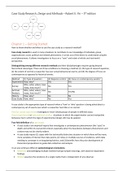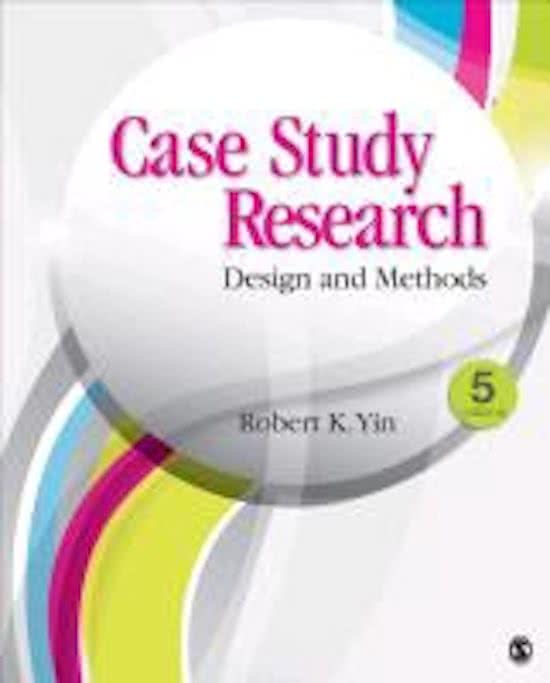Case Study Research, Design and Methods – Robert K. Yin – 5th edition
Chapter 1 – Getting Started
How to know whether and when to use the case study as a research method?
Case study research is used in many situations to contribute to our knowledge of individual, group,
organizational, social, political and related phenomena. It arises out of the desire to understand complex
social phenomena. It allows investigators to focus on a “case” and retain a holistic and real-world
perspective.
Distinguishing among different research methods and their (dis)advantages requires going beyond
hierarchical stereotype. There are three conditions to choosing a method: (1) the type of research question,
(2) the extent of control a researcher has over actual behavioural events, and (3) the degree of focus on
contemporary as opposed to historical events.
Method (1) Type of question (2) Requires control (3) Focus on contemporary events?
Experiment How, why? Yes Yes
Who, what, where, how
Survey No Yes
many, how much?
Archival Who, what, where, how
No Yes/No
Analysis many, how much?
History How, why? No No
Case Study How, why? No Yes
A case study is the appropriate type of research when a ‘how’ or ‘why’ question is being asked about a
contemporary set of events over which a researcher has little or no control.
Field (or social) experiment: investigators ‘treat’ whole groups of people in different ways.
Quasi-experimental or observational studies: situations in which the experimenter cannot manipulate
behaviour but in which the logic of experimental design still may be applied.
Two-fold definition of a case study:
• A case study is an empirical inquiry that investigates a contemporary phenomenon (the ‘case’) in
depth and within its real-world context, especially when the boundaries between phenomenon and
context may not be clearly evident.
• A case study inquiry (1) copes with the technically distinctive situation in which there will be many
more variables of interest than data points, (2) relies on multiple sources of evidence, witch data
needing to converge in a triangulating fashion, and (3) benefits from the prior development of
theoretical propositions to guide data collection and analysis.
It can also embrace different epistemological orientations:
• Relativist: acknowledging multiple realities having multiple meanings, with observer dependent
findings.
• Realist: assumes the existence of a single reality that is independent of any observer.
, Case study research includes both single- and multiple-case studies. It can include and be limited to
quantitative evidence. And it has its own place in doing evaluations in at least 4 different applications:
• Explain the presumed causal links in real-world interventions.
• Describe and intervention and the real-world context in which it occurred.
• Illustrate certain topics within an evaluation
• Enlighten those situations in which the intervention being evaluated has no clear, singe set of
outcomes.
There are some traditional concerns about case study research:
• Case studies need to be more rigorous
• Case studies are being confused with the case studies used in teaching.
• Case study research has an apparent inability to generalize from its findings.
• Case studies can potentially take too long and can result into massive, unreadable documents.
• Case study research has unclear comparative advantages in contrast to other research methods
Chapter 2 – designing case studies
Research design: the logical sequence that connects the empirical data to a study’s initial research
questions and to its conclusions. Its main purpose is to help avoid the situation in which the evidence does
not address the initial research question.
Five components of a case study research design are important:
1. Question – most likely a ‘how’ or ‘why’ question.
2. Propositions – each directs attention to something that should be examined within the scope of
study. Some studies have a legitimate reason for not having any propositions, when the topic is the
subject of exploration.
3. Units of analysis – consists of two steps: (1) defining the case: individuals, small groups,
organizations, (partnerships, communities, relationships, decisions, projects, events,) etc.; and (2)
bounding the case: the immediate topic of the case study must be distinguished from the context.
4. Logic linking the data to the propositions – this can create a more solid foundation for the later
analysis.
5. Criteria for interpreting the findings
For case studies, some theory development as part of the design phase is highly desired. The benefit is a
stronger design and a heightened ability to interpret your eventual data. It takes time and it can be difficult.
For other topics the existing knowledge base may be poor so an empirical study is likely to be exploratory.
Literature review can help overcome barriers to theory development. You should be aware of the full
range of theories that might be relevant to your study. Types of theories: (1) implementation theory, (2)
individual theory, (3) group theory, (4) organizational theory, (5) societal theory and (6) decision-making
theory.
Having some theory or theoretical propositions will later play a critical role in helping you generalize the
lessons learned from your case study.
Statistical generalization: an inference is made about a population on the basis of empirical data collected
from a sample of that universe. It is a more commonly recognized way of generalizing.
Rather than thinking about your case as a sample, you should think of it as the opportunity to shed
empirical light about some theoretical concepts or principles. The analytic generalization may be based on
either (1) corroborating, modifying, rejecting or advancing theoretical concepts that you referenced in
designing your case study or (2) new concepts that arose upon the completion of your case study.






